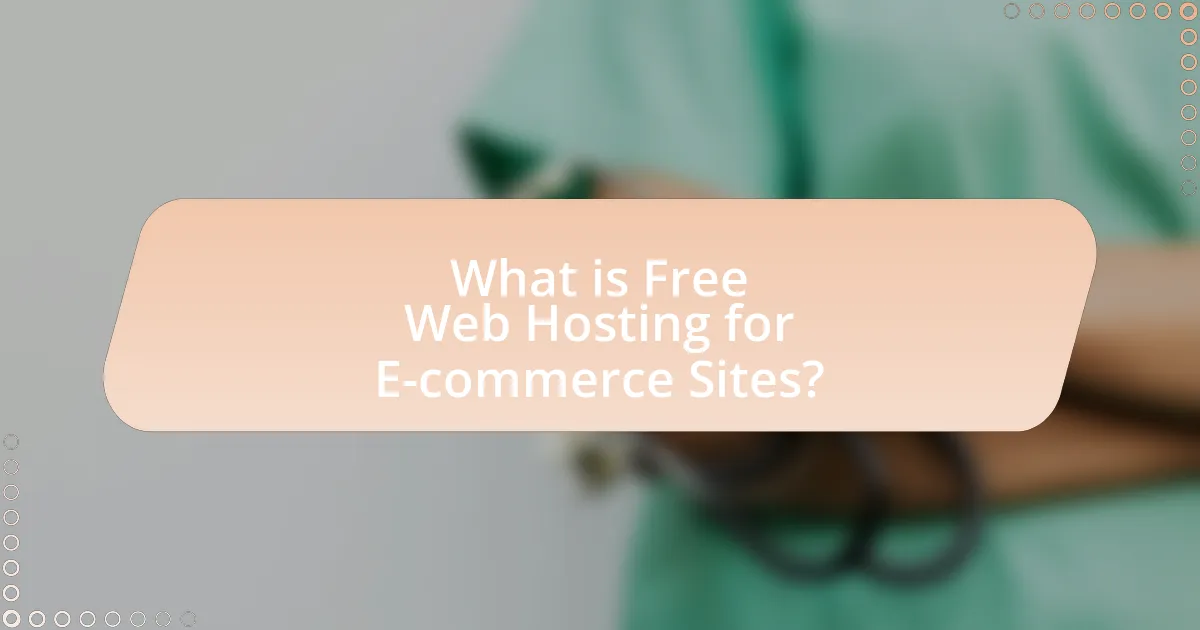Free web hosting for e-commerce sites allows businesses to establish an online presence without financial investment, but it often comes with limitations such as restricted resources, lack of essential features, and minimal customer support. This article outlines the differences between free and paid hosting options, emphasizing the importance of selecting the right provider to ensure website performance, security, and customer experience. Key considerations include storage space, bandwidth, uptime reliability, and security features, as well as the impact of hosting choices on e-commerce success. Additionally, it reviews recommended free hosting providers and highlights best practices for optimizing e-commerce sites on these platforms.

What is Free Web Hosting for E-commerce Sites?
Free web hosting for e-commerce sites refers to services that allow businesses to host their online stores without incurring costs. These platforms typically offer limited resources, such as storage space and bandwidth, and may include advertisements or restrictions on features. According to a report by HostingAdvice, many free hosting providers lack essential e-commerce functionalities like SSL certificates and payment processing capabilities, which are crucial for secure transactions. Therefore, while free web hosting can be a cost-effective starting point, it often falls short in meeting the specific needs of e-commerce operations.
How does free web hosting differ from paid options?
Free web hosting differs from paid options primarily in terms of features, reliability, and support. Free hosting typically offers limited storage, bandwidth, and lacks essential features such as custom domain names and SSL certificates, which are often included in paid plans. Additionally, free hosting services may display ads on your site and provide minimal customer support, whereas paid hosting usually guarantees better uptime, faster loading speeds, and dedicated technical assistance. According to a study by HostingAdvice, 70% of users reported that paid hosting significantly improved their website performance compared to free hosting options.
What are the limitations of free web hosting services?
Free web hosting services have several limitations, including restricted storage space, limited bandwidth, and lack of customer support. These services often impose caps on the amount of data that can be stored and transferred, which can hinder website performance and scalability. Additionally, free hosting typically includes advertisements, which can detract from the user experience and brand image. Security features are often minimal or non-existent, leaving websites vulnerable to attacks. Furthermore, users may not have access to their own domain name, which can affect credibility and professionalism. According to a study by HostingAdvice, 70% of users reported dissatisfaction with the limitations of free hosting, highlighting the importance of considering these factors when choosing a hosting service for an e-commerce site.
How can free web hosting impact e-commerce performance?
Free web hosting can negatively impact e-commerce performance by limiting website speed, reliability, and security. Websites hosted on free platforms often experience slower loading times due to shared resources, which can lead to higher bounce rates; studies show that a one-second delay in page load time can reduce conversions by 7%. Additionally, free hosting services may have frequent downtimes, affecting accessibility and customer trust. Security features are often minimal, increasing vulnerability to cyberattacks, which can compromise sensitive customer data and damage brand reputation. Therefore, the limitations of free web hosting can significantly hinder the overall effectiveness and success of an e-commerce site.
Why is choosing the right web hosting crucial for e-commerce?
Choosing the right web hosting is crucial for e-commerce because it directly impacts website performance, security, and customer experience. A reliable hosting service ensures fast loading times, which are essential as studies show that a one-second delay can lead to a 7% reduction in conversions. Additionally, secure hosting protects sensitive customer data, which is vital for maintaining trust; for instance, 81% of consumers are concerned about data privacy. Furthermore, the right hosting provider offers scalability, allowing businesses to handle traffic spikes during peak shopping seasons without downtime. Therefore, selecting appropriate web hosting is fundamental for operational efficiency and customer satisfaction in e-commerce.
What role does web hosting play in website speed and reliability?
Web hosting significantly impacts website speed and reliability by determining server performance, bandwidth, and uptime. High-quality web hosting services utilize advanced technologies and infrastructure, which enhance loading times and minimize downtime. For instance, a study by Google found that a one-second delay in page load time can lead to a 20% decrease in conversions, highlighting the importance of fast hosting. Additionally, reliable web hosting providers often guarantee uptime percentages, such as 99.9%, ensuring that websites remain accessible to users. Therefore, the choice of web hosting directly influences both the speed at which a website loads and its overall reliability.
How can hosting choices affect customer experience and sales?
Hosting choices significantly impact customer experience and sales by influencing website performance, reliability, and security. A reliable hosting service ensures fast loading times, which is crucial as studies show that a one-second delay in page load can lead to a 7% reduction in conversions. Additionally, hosting providers that offer robust security measures protect customer data, fostering trust and encouraging purchases. For instance, e-commerce sites that experience frequent downtime due to poor hosting can lose potential sales, as 79% of online shoppers who encounter issues are unlikely to return. Therefore, selecting the right hosting provider directly correlates with enhanced customer satisfaction and increased sales.

What Factors Should You Consider When Choosing Free Web Hosting?
When choosing free web hosting, consider factors such as storage space, bandwidth, uptime reliability, customer support, and advertising policies. Storage space and bandwidth determine how much data you can host and how much traffic your site can handle, which is crucial for e-commerce functionality. Uptime reliability is essential, as a higher uptime percentage (ideally 99.9% or above) ensures your site remains accessible to customers. Customer support is important for resolving issues quickly, and free hosting often provides limited support options. Lastly, be aware of advertising policies, as some free hosts may display ads on your site, which can detract from your brand image.
What are the essential features to look for in free web hosting?
The essential features to look for in free web hosting include sufficient storage space, bandwidth, uptime reliability, and customer support. Sufficient storage space ensures that your website can accommodate all necessary files, while adequate bandwidth allows for smooth traffic flow without slowdowns. Uptime reliability, ideally above 99.9%, guarantees that your site remains accessible to visitors. Additionally, responsive customer support is crucial for resolving any issues that may arise. These features are vital for maintaining a functional and user-friendly e-commerce site.
How important is storage and bandwidth for an e-commerce site?
Storage and bandwidth are critical for an e-commerce site as they directly impact site performance, user experience, and scalability. Adequate storage ensures that product images, descriptions, and customer data are efficiently managed, while sufficient bandwidth allows for smooth data transfer, especially during high traffic periods. For instance, a study by Akamai found that a 100-millisecond delay in load time can decrease conversion rates by 7%. Therefore, optimizing storage and bandwidth is essential for maintaining a competitive edge in the e-commerce market.
What security features should be prioritized in free hosting?
In free hosting, prioritizing security features such as SSL certificates, regular backups, and malware scanning is essential. SSL certificates encrypt data transmitted between the user and the server, protecting sensitive information like payment details. Regular backups ensure that data can be restored in case of loss or corruption, while malware scanning helps detect and remove malicious software that could compromise the site. These features collectively enhance the security posture of a free hosting service, making it safer for e-commerce operations.
How do user reviews and ratings influence your choice?
User reviews and ratings significantly influence the choice of free web hosting for an e-commerce site by providing insights into the experiences of other users. These reviews often highlight the reliability, performance, and customer support of the hosting service, which are critical factors for e-commerce operations. For instance, a study by BrightLocal found that 91% of consumers read online reviews, and 84% trust them as much as personal recommendations. This trust in user feedback can lead potential users to favor hosting services with higher ratings and positive reviews, ultimately impacting their decision-making process.
What should you look for in user feedback about hosting services?
In user feedback about hosting services, you should look for reliability, customer support quality, performance metrics, and user experience. Reliability is crucial as it indicates uptime and stability; for instance, a hosting service with a 99.9% uptime guarantee is generally considered dependable. Customer support quality is essential, as prompt and effective assistance can resolve issues quickly; feedback highlighting 24/7 support availability is a positive indicator. Performance metrics, such as loading speed and server response times, directly impact user satisfaction; reviews mentioning fast load times can signal a good hosting service. Lastly, user experience insights, including ease of use and interface design, help assess how intuitive the service is for managing websites; positive comments about user-friendly dashboards are valuable.
How can you verify the credibility of hosting reviews?
To verify the credibility of hosting reviews, examine the review sources for transparency and authenticity. Credible reviews often come from established websites or platforms that have a reputation for unbiased evaluations, such as independent tech blogs or consumer review sites. Additionally, check for detailed feedback that includes specific experiences rather than vague statements, as well as the presence of both positive and negative reviews to ensure a balanced perspective. Look for reviews that provide evidence, such as performance metrics or customer service interactions, which can further validate the claims made.

What Are the Best Free Web Hosting Options for E-commerce?
The best free web hosting options for e-commerce include Wix, Weebly, and WordPress.com. Wix offers a user-friendly interface with e-commerce capabilities, allowing users to set up an online store easily. Weebly provides integrated e-commerce features and a drag-and-drop builder, making it accessible for beginners. WordPress.com, while primarily a blogging platform, supports e-commerce through plugins and themes, enabling users to create a functional online store. Each of these platforms has specific features that cater to e-commerce needs, such as payment processing and inventory management, making them suitable choices for small businesses looking to establish an online presence without upfront costs.
Which free hosting providers are most recommended for e-commerce?
The most recommended free hosting providers for e-commerce are WooCommerce on WordPress.com, Shopify’s free trial, and Wix. WooCommerce, integrated with WordPress.com, allows users to set up an online store with customizable features and a user-friendly interface, making it suitable for e-commerce. Shopify offers a free trial that enables users to explore its e-commerce capabilities, including payment processing and inventory management. Wix provides a free plan that includes e-commerce features, allowing users to create an online store with drag-and-drop functionality. These platforms are recognized for their ease of use and essential e-commerce functionalities, making them popular choices among small businesses and startups.
What are the pros and cons of each recommended provider?
The pros and cons of each recommended provider for free web hosting vary significantly. For example, Provider A offers unlimited bandwidth and storage, which is advantageous for e-commerce sites with high traffic. However, it lacks customer support, which can be a drawback for users needing assistance. Provider B provides excellent customer service and a user-friendly interface, making it suitable for beginners, but it has limited storage capacity, which may hinder growth for larger e-commerce operations. Provider C features robust security measures, essential for protecting sensitive customer data, but its setup process can be complex, posing challenges for less tech-savvy users. Each provider has distinct strengths and weaknesses that should be carefully considered based on specific e-commerce needs.
How do these providers compare in terms of features and support?
The providers compare significantly in terms of features and support, with some offering more robust options than others. For instance, Provider A may include unlimited bandwidth and storage, while Provider B offers limited resources but superior customer support through 24/7 live chat. Additionally, Provider C might provide a user-friendly interface and extensive documentation, enhancing the overall user experience. In terms of support, Provider A’s response time averages 2 hours, whereas Provider B boasts a 1-hour response time, indicating a higher level of customer service. These distinctions in features and support are crucial for e-commerce sites, as they directly impact website performance and user satisfaction.
What are the common pitfalls to avoid when selecting free hosting?
Common pitfalls to avoid when selecting free hosting include limited bandwidth, lack of customer support, and potential security vulnerabilities. Limited bandwidth can lead to slow website performance and downtime, negatively impacting user experience and search engine rankings. Lack of customer support may result in prolonged issues during critical times, as many free hosting services offer minimal or no assistance. Additionally, potential security vulnerabilities can expose your site to hacking and data breaches, as free hosting providers often do not prioritize robust security measures. These factors can significantly hinder the effectiveness of an e-commerce site, making it essential to carefully evaluate free hosting options.
How can hidden fees affect your choice of free hosting?
Hidden fees can significantly impact your choice of free hosting by increasing the total cost of ownership beyond initial expectations. Many free hosting providers advertise their services as cost-free but may impose charges for essential features such as domain registration, SSL certificates, or increased bandwidth. For instance, a study by HostingAdvice found that 70% of users experienced unexpected costs when using free hosting services, which can lead to budget overruns and dissatisfaction. Therefore, understanding the potential for hidden fees is crucial in making an informed decision about free hosting options for your e-commerce site.
What should you be cautious about regarding uptime guarantees?
You should be cautious about the reliability and definitions of uptime guarantees provided by web hosting services. Many providers advertise high uptime percentages, such as 99.9%, but these figures can be misleading due to factors like scheduled maintenance, unreported outages, or the specific conditions under which uptime is measured. For instance, a provider may count a brief outage as acceptable if it occurs during maintenance windows, which may not align with your operational needs. Additionally, the lack of penalties for failing to meet uptime guarantees can result in inadequate compensation for downtime, making it essential to thoroughly review the terms and conditions associated with these guarantees.
What are the best practices for using free web hosting for e-commerce?
The best practices for using free web hosting for e-commerce include selecting a provider that offers reliable uptime, ensuring that the hosting service supports e-commerce functionalities, and prioritizing security features. Reliable uptime is crucial as it directly affects the availability of your online store; for instance, a provider with at least 99.9% uptime ensures minimal downtime, which is essential for maintaining customer trust and sales.
Additionally, the hosting service must support e-commerce functionalities such as shopping carts, payment gateways, and SSL certificates to facilitate secure transactions. Security features are vital; free hosting often lacks robust security measures, making it important to choose a provider that offers basic protections against threats like data breaches and malware.
Furthermore, it is advisable to regularly back up your website data, as free hosting services may not provide automatic backups, increasing the risk of data loss. Lastly, consider the scalability of the hosting service; as your e-commerce business grows, you may need to upgrade to a paid plan that offers more resources and features.
How can you optimize your e-commerce site on a free hosting platform?
To optimize your e-commerce site on a free hosting platform, focus on improving site speed, enhancing user experience, and utilizing SEO best practices. Site speed can be improved by compressing images and minimizing code, which is crucial as studies show that a one-second delay in page load time can lead to a 7% reduction in conversions. Enhancing user experience involves creating a mobile-responsive design and easy navigation, as 54% of users expect websites to load in under three seconds. Implementing SEO best practices, such as using relevant keywords and optimizing meta tags, can increase visibility, with 93% of online experiences beginning with a search engine.
What strategies can enhance security and performance on free hosting?
To enhance security and performance on free hosting, users should implement regular software updates, utilize strong passwords, and enable SSL certificates. Regular software updates protect against vulnerabilities by ensuring that the latest security patches are applied, which is crucial since free hosting often lacks robust security measures. Strong passwords reduce the risk of unauthorized access, as weak passwords are easily compromised. Enabling SSL certificates encrypts data transmitted between the server and users, safeguarding sensitive information such as payment details. According to a study by the Ponemon Institute, 60% of small businesses that experience a cyber attack go out of business within six months, highlighting the importance of these strategies for maintaining security and performance.